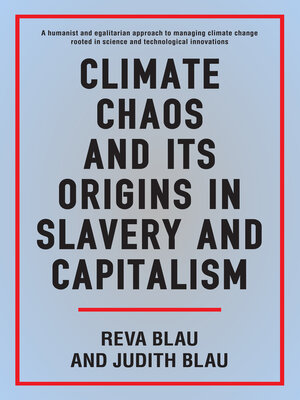Climate Chaos and its Origins in Slavery and Capitalism
ebook ∣ Anthem Sociological Perspectives on Human Rights and Development
By Reva Blau

Sign up to save your library
With an OverDrive account, you can save your favorite libraries for at-a-glance information about availability. Find out more about OverDrive accounts.
Find this title in Libby, the library reading app by OverDrive.



Search for a digital library with this title
Title found at these libraries:
| Library Name | Distance |
|---|---|
| Loading... |
Climate Chaos provides readers the latest consensus among international scientists on the cascading impacts of climate change and the tipping points that today threaten to irreversibly destroy the delicate balance of the Earth's ecosystems. The book argues that deregulation and an expansion of fossil fuel extraction have already tipped the planet towards a climate that is out of control. This crisis will cause massive human suffering when extreme weather, pollution and disease lead to displacement, food and water shortages, war, and possibly species extinction.
The repression of science creates an existential crisis for humanity that has reached crisis proportions in the twentieth-first century. The scale of the crisis has prompted a call for geoengineering, large interventions into the climate by technological innovation. However, the history of colonialism and slavery make the technological and monetary elites untrustworthy to solve this humanitarian and planetary crisis. While the elites have always cast certain groups of humanity as expendable, the climate crisis makes a true humanist and egalitarian movement based in human rights and dignity not only aspirational but also existentially mandatory. The crisis demands that we remake the world into a more just and safe place for all the world's people.
|Climate Chaos provides readers the latest consensus among international scientists on the cascading impacts of climate change and the tipping points that today threaten to irreversibly destroy the delicate balance of the Earth's ecosystems. The book covers some controversial topics: that slavery in the American South is the origin of capitalism; the indigenous perspective on the environment ("Mother Earth" movement), international debates about the response to accelerating climate change, and the failure of the U.S. government to be part of the international effort to slow climate change.
The book argues that deregulation and an expansion of fossil fuel extraction have already tipped the planet towards a climate that is out of control. This crisis will cause massive human suffering when extreme weather, pollution and disease lead to displacement, food and water shortages, war, and possibly species extinction.
The repression of science creates an existential crisis for humanity that has reached crisis proportions in the twentieth-first century. The scale of the crisis has prompted a call for geoengineering, large interventions into the climate by technological innovation. However, the history of colonialism and slavery make the technological and monetary elites untrustworthy to solve this humanitarian and planetary crisis. While the elites have always cast certain groups of humanity as expendable, the climate crisis makes a true humanist and egalitarian movement based in human rights and dignity not only aspirational but also existentially mandatory. The crisis demands that we remake the world into a more just and safe place for all the world's people.







